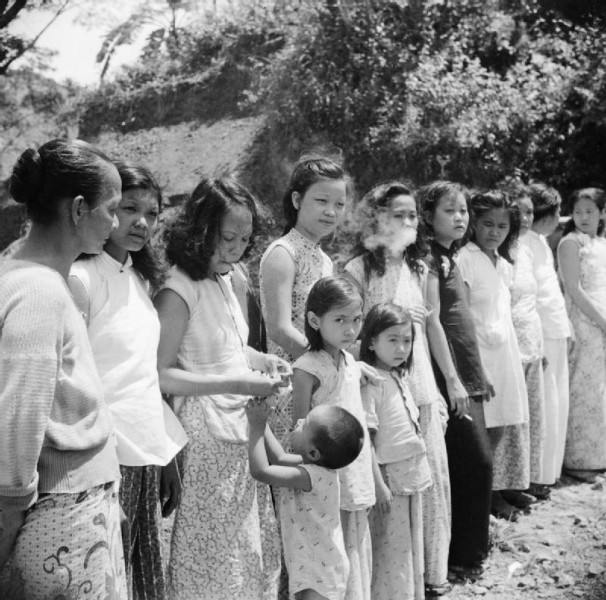Denying Japan’s Responsibility for WWII Sex Slaves Only Makes Japan Look Worse

Chinese and Malayan girls forcibly taken from Penang by the Japanese to work as ‘ianfu’ (military sex slaves) for Japanese troops. Public domain
In World War II, women from more than ten countries were forced into sexual slavery by the Imperial Japanese Army. These women were euphemistically called ‘ianfu’ (comfort women) in Japanese, and have long been a source of political controversy.
In an effort to protect Japan's self-esteem, Japanese historical revisionists refuse to admit the misdeeds of the Imperial Japanese army in spite of a mountain of proof that suggest sexual slavery in World War II was organized and methodical.
A recent discussion among Twitter users offers a glimpse of the arguments used to defend the wartime practice.
User @dragoner_jp articulates a common mistake when discussing sexual slavery in World War II:
従軍慰安婦問題で日本の保守は「強制は無かった」事を争点に置きたがるけど、韓国は強制性についてはほとんど議論の対象外で、いくら日本が強制性無いと言っても噛み合わないんよ。この時点で「論破」が虚しい事になっている
— dragoner (@dragoner_JP) Mar 5, 2014
Japanese conservatives often claim “they were never forced” and make individual choice the focus of comfort women discussion.
However, Koreans attach little importance as to whether or not women were forced to work in brothels servicing troops during the war, so it makes no sense for Japan to insist passionately on it.
This makes this debate meaningless.
The treatment of comfort women has long strained ties between Korea and Japan. Japan colonized Korea between 1905 and 1945, and the Japanese occupation of the country could be quite brutal.
During the Second World War Japanese colonial authorities conscripted tens of thousands of women from the Korean Peninsula and other parts of Asia to serve as comfort women.
Perceptions that the Japanese government refuses to acknowledge the issue or even deny the existence of comfort women continues to provoke protests in South Korea.
超簡単に言うと、「従軍慰安婦はいたけど、合意の上で強制は無かったし、政府や軍が関与していないので責任は無い」ってロジックで国際的に主張すると、「スッキリしたのはテメェだろ!」と却って気持ち悪がられるのです。慰安婦問題で日本側が海外で講演すると、逆に反感を持つ人間が増えたとも……
超簡単に言うと、「従軍慰安婦はいたけど、合意の上で強制は無かったし、政府や軍が関与していないので責任は無い」ってロジックで国際的に主張すると、「スッキリしたのはテメェだろ!」と却って気持ち悪がられるのです。慰安婦問題で日本側が海外で講演すると、逆に反感を持つ人間が増えたとも……
— dragoner (@dragoner_JP) Mar 5, 2014
To put it very simply, people in other countries feel even more disgusted when they hear the argument that, in an attempt to defend the Imperial Japanese army, “Yeah, the Japanese army had comfort women for sure, but it was by mutual consent, and nobody was ever forced into it. [As Japanese citizens] we bear no responsibility because our government and army had nothing to do with it.”
The response by other countries is, “Why do you assume we will be convinced [that the Japanese army did nothing wrong] by using that logic?” The sense of disgust towards Japan intensifies every time Japan apologists make this argument!
@boreford agrees and summarizes the discussion:
「売春婦なので問題はない」
「連れてきたのは民間業者なので問題はない」
と声高に言えば言うほどイメージ悪化するよね
— 糸畑要 (@boreford) Mar 5, 2014
The more you argue “No problem, because they were prostitutes. And it was private contractors who brought them, not the Japanese army,” the worse you look.
@raise9393 disagrees, and in the process provides a perfect example of wrong-headed thinking:
@dragoner_JP @tsuyup つまり慰安婦はブラック企業よろしく搾取、つまり「性奴隷」にされていたということですか? 当時は売春が合法でしたし、慰安婦も大金を稼いだり、軍は衛生面などの待遇も気を遣っていました。 ブラック企業の社員のほうがはるかに待遇が悪いです。
— レイズ (@raise9393) March 5, 2014
In other words, you mean comfort women were exploited just like employers of sweatshops and used as “sex slaves?”
Prostitution was legal at the time, and the comfort women made big money. Moreover, the army paid special attention to their treatment such as making sure they worked in sanitary conditions. The treatment of employers of sweatshops are far worse than [the Japanese army ever was].
@dragoner_jp fired back:
趣旨は、『そういう事を主張するから「引かれる」』という事です RT @raise9393 @dragoner_JP @tsuyup 当時は売春が合法でしたし、慰安婦も大金を稼いだり、軍は衛生面などの待遇も気を遣っていました。 ブラック企業の社員のほうがはるかに待遇が悪いです。
— dragoner(@dragoner_JP) Mar 5, 2014
The arguments [you are making in your tweet here] are exactly what I have am talking about, and are exactly the sorts of arguments that make people in other countries disgusted [with Japan]:
RT@raise9393 @dragoner_JP @tsuyup Prostitution was legal at the time, and the comfort women made big money. Moreover, the army paid special attention to their treatment such as making sure they worked in sanitary conditions. The treatment of employers of sweatshops are far worse than [the Japanese army ever was].